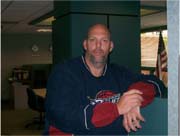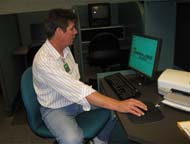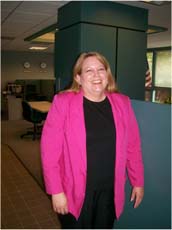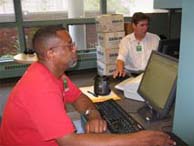Akron’s 5.5 percent unemployment rate, leaving approximately 5,900 people unemployed (Akron Beacon Journal, May 21, 2008) certainly hasn’t helped the homeless.
At an age when one would hope to be secure in a job or even close to retirement, many of those at the Haven of Rest are just beginning; most of them having nothing to show for the past 20 or so years of their lives.
These men and women are homeless due to a variety of reasons - the majority being their addictions to drugs and alcohol and inability to keep a job.
The Learning Center
Located on Market Street in Akron, the Haven of Rest offers the homeless a place to stay, and provides them with the resources they need in order to pick up the pieces of their lives. Here they are given a second chance and the opportunity to rebuild.
The Haven of Rest helps prepare residents to re-enter the “real world” by offering classes to give the skills they need in order to find employment. The goal is to get them on their feet so that they can make it on their own without having to rely on handouts from the church, strangers, or government assistance.
Currently 23 residents are in the program.
History
The Learning Center came into existence in 1993, a year after Reverend Walker, (  then Administer of the Men’s Division) and Reverend Thomas, (the Executive Director at that time) saw the need to add another dimension to the Haven of Rest programming focusing solely on education.
then Administer of the Men’s Division) and Reverend Thomas, (the Executive Director at that time) saw the need to add another dimension to the Haven of Rest programming focusing solely on education.
Instead of implementing their own program, through research they found a program started by a company called Innovated Learning Systems (ILS). ILS offers learning material targeted specifically towards homeless men and women. After investigating the program and seeing how well it worked in a rescue mission in Los Angeles, Rev. Walker and Rev. Thomas decided to purchase it.
The Focus
Classes in the Learning Center focus mainly on computer literacy and learning about computer operation; including Word Processing, Spreadsheet Databases, Windows and the Internet - because many of the residents are computerilliterate.
 “So many are afraid to even touch a computer,” Jack Hugg, Education Coordinator, said “because they’re afraid their going to harm it or blow it up.”
“So many are afraid to even touch a computer,” Jack Hugg, Education Coordinator, said “because they’re afraid their going to harm it or blow it up.”
They also teach reading, writing and math, and offer the residents an opportunity to get their GED. One man who came to the program with only a third grade reading level was able to read an entire section of scripture at one oftheir dedication ceremonies. He did this after taking a Video Phonics class (similar to Hooked on Phonics).
Career Development
 After graduating Hugg’s classes at the Learning Center, the residents begin Career Development.
After graduating Hugg’s classes at the Learning Center, the residents begin Career Development.
L.J. Dalton, the Career Development Coordinator, wearing a bright pink blazer that matched her bubbly personality, explained that she teaches the guys how to find a job. For the past ten years she’s done everything from helping the residents create their resumes, to setting up mock interviews. It is her passion to make what they do fun, taking a not-so fun-topic (job searching) and turning it into a positive experience. “We see every ‘no’ as one step closer to a ‘yes’,” she smiled while explaining how the men handle rejection from a potential employer.
She is also the woman famous for throwing ice cream parties.
“One of the things that I love to do more than anything,” she said, “is eat ice cream. So I share it!”
Every four or five months she sets up tables, filling them with bowls of ice cream, bananas, hot fudge, whipped cream, cherries and other treats for the residents to enjoy.
Where They Begin…
Though they have their fun, they do get down to business. Each resident starts with a career search and they are asked about what they like to do and what they don’t like, and what they are good at and not good at. At the end of this assessment they come up with an alphabetical code which gives them anywhere from 20-100 jobs that they might be interested in – opening up a world of opportunity that most of them never knew existed.
“What we’re trying to do is get them to think outside of the box,” Dalton said.
She explained that some have worked in the food industry or a factory and hated it, yet they stayed there anyway because it’s all that they had ever done.
“The idea is to find them a job in an area that they want to be in,” she said, “because if you like going to work, you’re going to be there everyday. If you hate your job it’s easy to come up with an excuse not to be there.”
It isn’t uncommon for residents to just skip work just because they don’t feel like going, and that’s the type of behavior Dalton hopes to diminish. This is why she shows them the wide variety of jobs available to them.
“It gives them an opportunity to search what else is out there,” she said, “and it helps them to set goals.”
Applications and Resumes
Another part of the process involves filling out applications. “There are some people who have never filled out an application before, so we help them fill in all of the blanks,” Dalton said.
She gives them what she refers to as “mock applications” to fill out, in order to get all of the information in one place. She also encourages them to call past employers to verify employment dates, and to look through the phonebook and internet to get addresses. “We help them put all of that together.”
They also write their resumes, and she teaches them how to sell their skills. “The idea is to find the key skills that they want to sell the employer,” she said.
And it’s her favorite part.
She begins by having them write down everything that they’ve ever done on every job. After typing up 3-4 pages, Dalton has them pick and choose what to put on the actual resume, “It’s the base to build from,” she said.
After putting together the resume men often act surprised, asking “This is me?”
“Well, you tell me,” Dalton replies, “you gave me the words and told me what to put on there. I typed it. That’s the only difference.”
The guys can’t believe that they put together a real resume that looks so professional. “It’s exciting when they can sell themselves,” she said.
Interviewing
 Preparation for interviews is also a part of the process. Dalton has a list of questions that employers generally ask. She has the residents write out their answers to the questions so that they can figure out what they want to say.
Preparation for interviews is also a part of the process. Dalton has a list of questions that employers generally ask. She has the residents write out their answers to the questions so that they can figure out what they want to say.
“If they write it out they get their thoughts in order,” she said.
During mock interviews she tells the resident “This is what I’m hearing,” and explains how she interpreted what they said, and then asks, “Is this what you were trying to say?”
A lot of the time they will say one thing, but she is hearing something completely different.
“I sort of play the devil’s advocate,” she said.
Barriers
Another key component is discussing barriers, and what the residents feel are barriers towards them getting a job.
“A lot of the barriers are all in the mind - they may not be realistic,” Dalton said.
One of the most common barrier mindsets is ‘I don’t have a four year degree, so I can’t get a job.’
“You don’t have to have a four year degree,” Dalton explained, “You can get in the door and show them what you have. Some people have a lot of experience but don’t have a college degree, and a lot of the time that experience will outweigh the college degree.”
It all depends on the employer. “The only way you’re going to know is to apply, so a lot of the time I just encourage the guys that there is a job out there for them and tell them that God wouldn’t have brought them through this program and bring them to this point only to say ‘I don’t have any more time. You’re on your own now.’”
She said, “He planned this all along and you just have to be willing to wait for the right job.”
The residents perceive other barriers in that they don’t have transportation, childcare, and some have criminal records. “Some barriers can be erased,” Dalton said, “and some don’t exist, so we need to talk through what is real and what isn’t.”
The Program
The program lasts about two months and the men have usually been staying at the Haven of Rest for six months before Dalton even begins working with them.
After going through all of the steps of her program they are able to start their job search. During that time they check in with her and set out a plan for each week, and at the end of the week they have to report on what they actually did. Accountability for how they spend their time is crucial.
They also go over how much it is going to cost them to live, and come up with a spending plan.
Aftercare Program
For the first six months to a year after they’ve left the Haven of Rest, they meet with Bob and Elaine Hopkins, Haven of Rest employees who run the aftercare program. Their mission is to offer support and meet with the graduates on a regular basis. Some participate in Bible studies, others just want accountability or to talk through their struggles.
They also help graduates of the program develop their own support group, making connections with other members from their church or Bible Study. Many of them have old friends that they need to stay away from.
Help!
If you would like to support this ministry in educating men and women, they are always in need of used computers and laser printers. “Anything that will help us stay current with technology,” Hugg said.
To keep programs like this running they are also in need of funds. Monetary donations to the Haven of Rest earmarked towards the Learning Center are very helpful and greatly appreciated.
You can reach this ministry at (330) 535-1563 or visit their website at: www.havenofrest.org/
If you have any story ideas, questions, or comments you can contact me at Katie@akroneur.com.